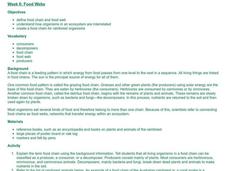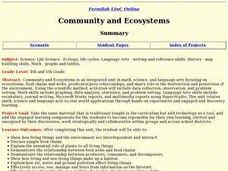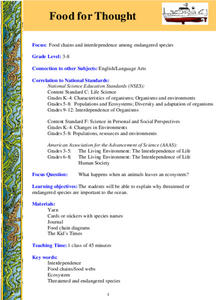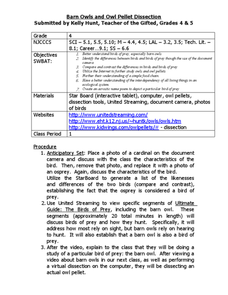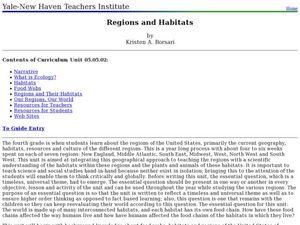Curated OER
Forest Food Webs
Students consider the interdependency of life in a temperate forest by studying selected organisms from an Asian temperate forest and creating a food web.
Curated OER
Tropical Forest Food Chain
Learners explore the interdependence of the animals and plants in tropical rainforests. They explore the importance of conserving biodiversity and tropical food chains. They create a tropical forest food chain and identify species that...
NorthEast Ohio Geoscience Education Outreach
Ecosystems and Change
Pairs of ecologists select an animal and investigate an ecosystem from its point of view. This simple lesson involves Internet research and putting together a presentation of collected information.
Curated OER
Marine Ecosystems
Students identify producers and consumers and construct a food chain from four marine ecosystems. They describe the delicate balance among organisms in each environment. In groups, students discuss the human activities that upset the...
Forest Foundation
The Web of Life
Producers, herbivores, carnivores, omnivores, decomposers. To begin a study of the forest ecosystem, learners examine the connections among the members of ecological communities.
Curated OER
Regents High School Examination: Living Environment 2010
This exam touches upon every topic within the typical first year biology course.. A broad variety of question styles give high schoolers every opportunity to show what they know. Why start from scratch when a comprehensive final exam is...
Curated OER
Food Webs
Students research rainforest animals and use that information to make a flow chart to show the order in which energy is transferred through several organisms. They label the producers, consumers, and decomposers in their chart.
Curated OER
5 Step Food Chain Lesson
Have your class discuss food chains using this resource. Learners watch a presentation on the food chain and how we are dependent on the smallest life forms. They write newspaper articles and create an illustration describing the food...
NOAA
Deep-Sea Ecosystems – Entering the Twilight Zone
Imagine an ecosystem without any light or oxygen, where living things convert carbon dioxide into food. This ecosystem is thriving and might just be the largest ecosystem on our planet, yet we know very little about it. The lesson...
Curated OER
Explore the Food Web
Young scholars identify plants and animals in the journals of Lewis and Clark's expedition. They describe the various animal habits. Students interpret the behaviors of the animals discovered on the expedition. They design a food web...
Curated OER
Exploring Ecosystems
Students examine the relationships between plants, animals, and the environment in ecosystems. They sort animal cards, collect natural materials from the schoolyard, and record an ecosystem web in the form of a poster.
Curated OER
Making a Food Web and Learning About Ecosystems
Third graders examine the difference between a food web and food chain. They also examine the importance of the sun in a food web and food chain. Students understand what happens when you remove parts of the chain.
Curated OER
Organisms and Their Environment
Students observe elements of a local ecosystem and gain an understanding of what elements make up an ecosystem. In this ecosystem lesson students create a class food web that shows the interactions among the elements of the...
Curated OER
The Web of Life - Ecosystem
Students examine the concepts of ecosystems and interdependence. They construct block pyramids to demonstrate interdependence, and map off an area to observe and identify animals. They create food chain mobiles and play a web of life game.
Curated OER
Community and Ecosystems
Students complete a unit of lessons on ecosystems. They participate in online activities, create a diorama, write journal entries, and develop a Hyperstudio multimedia project on a selected ecosystem.
Curated OER
Food for Thought
Students explore the food chains in a variety of ecosystems and its relationship to the survival of threatened or endangered marine animals or fish in the ocean. The interdependence of the species is investigated in this lesson.
University of California
Energy and Biomass Pyramids
Young scientists play tag as they act out the food pyramid in the ocean ecosystem. Energy circles pass from the smaller prey to the predators and at the end of the activity, a data chart and analysis questions allow pupils to apply their...
NOAA
Marine Ecosystems
Be at the top of the food chain when it comes to understanding marine ecosystems. The 21st installment of a 23-part NOAA Enrichment in Marine sciences and Oceanography (NEMO) program investigates marine ecosystems, ocean zones, and food...
Curated OER
Barn Owls and Owl Pellet Dissection
Students explore birds of prey and food chains. For this ecosystems and birds of prey cross curriculum science and literacy lesson, students brainstorm characteristics of birds after viewing photographs. Students view a video and...
Curated OER
Fish Are Animals Too
Students create posters that show how a shark is a major predator in kelp forests and coral reefs after studying the food webs for these ecosystems. They determine that fish are important animals in the ocean's web of life.
Curated OER
Owl Pellets
Sixth graders investigate the role of owls in their ecosystem. In this food chain lesson, 6th graders illustrate an owl food chain, dissect an owl pellet, and analyze data. Students discuss what would happen to owls if there were an...
Curated OER
Regions and Habitats
Fourth graders identify the different habitats found in the seven regions of the United States. In this ecology instructional activity, 4th graders write an essay about how humans affect the ecosystem and vice versa. They discuss how...
National Park Service
Living & Non-Living Interactions
What better way to learn about ecosystems than by getting outside and observing them first hand? Accompanying a field trip to a local park or outdoor space, this series of collaborative activities engages children in...
August House
Go to Sleep, Gecko
Use this multidisciplinary instructional activity to delve into these subjects: English language arts, math, science, drama, and character education. After reading, discussing, and making interpretations about Go To Sleep, Gecko!: A...






